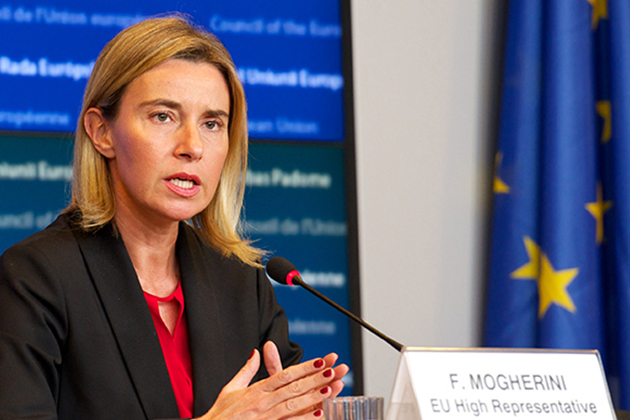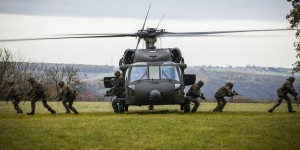Thank you Madame Chair.
As the rapporteur rightly pointed out, work to strengthen the European Union in the security and defence field has started with the presentation of the Global Strategy in the Council exactly one year ago. By the way, this is why I am sitting for the first time in these two years and a half on this side of the hemicycle – because it is clear in our Treaties and it is clear in the work we have done that the work on EU security and defence lies in the hands of the Council competences.
We have started last year a strong work – unanimous work, still at 28 – to respond to the need of security of our citizens with a very sustained work. Let me say that first of all, a security and European approach to security is a priority for all European citizens. No matter in which country – East, West, North, South – no matter what kind of political backgrounds our citizens have, the European defence and security is mentioned as a top priority in all Eurobarometer surveys that have been conducted in the last year or so.
And second, because we realised that we have to make full use of the instruments that the Lisbon Treaty gives to the European Union. This is an issue where the [European] Parliament has always been very strong – demanding the full use of all the instruments that we have. I remember very well in the hearing I had in AFET [the European Parliament’s Committee on Foreign Affairs] at the beginning of my mandate that was a point very strongly made.
So it is not something that was started as a reaction to some external factors or semi-external factors like the British Referendum. But there were some accelerating elements, or I would say, factors that intensified the political will to make of security and defence in the European Union one of the fields where the Council wants to re-launch the European Union integration process.
And this is why in Rome, during the celebrations for the 60th Anniversary of our Treaty, this field was indicated clearly as one of the priority fields for the re-launch of the European Union – clearly not the only one. And here comes the picture in which we do our work on security and defence.
Because I want to clarify, first, our work is not leading to a “militarisation” of the European Union. It is not leading to a European Union army. If there is anyone in the world that knows the power of soft power, the need to combine different instruments, the need to have an integrated approach in responding to crisis and conflicts, in using all different tools from the diplomatic to the humanitarian, the development, the economic, the cultural one – well, this is the European Union.
There is a genuine European way to security and defence. It is made of civilian and military means together, hard and soft power together, cooperation with our partners and also strategic autonomy. And let me say that in particular in these times, if we want to be able and free to do security our own way – our own European way – we need to strengthen our own capabilities and capacities to act also as a security provider for our citizens and also for our partners in the world.
So, the European Union not only is but will stay the most relevant donor of humanitarian and development aid – and that is going to remain. We are going to stay the main pillar of the multilateral system based on the UN agencies, on the UN values and principles, and also on the approach that preventing a conflict is always better than dealing with it militarily.
We know very well there is no single crisis or threat in the world that can be dealt with a purely military approach. This is the European way to security and I want there to be no doubt about the fact that this approach is not changing. But at the same time, we can and we must do better and more efficiently on defence and security in the narrow sense of the word. And I often say security for us is also development cooperation, it is also climate change action, it is also investment in peacekeeping, and so on. Having said that, we have a responsibility to use the instruments we have also when it comes to security and defence in the narrow sense.
This work has been taken forward in, as I said, the follow-up of the EU Global Strategy since last summer. It includes the work done by the Commission, on which Jyrki Katainen [European Commissioner for Jobs, Growth, Investment and Competitiveness] and Elżbieta Bieńkowska [European Commissioner for Internal Market, Industry, Entrepreneurship and SMEs] will share with you more details, and includes work that has been taken forward in full cooperation with NATO in line with the Joint Declaration signed at the NATO Warsaw Summit last July.
And I also want to be very clear on this that the work we are doing to strengthen the European defence is also a matter of strengthening NATO, and is beneficial for both. I just reported last week with Jens Stoltenberg [NATO Secretary General] on our 42 joint actions that we did – European Union and NATO together – being different in nature, organisation, but contributing both to the European security.
So let me also recall that the decisions on defence budgets – the spending more on defence – is not a matter for the European institutions. It is a matter for national governments and national parliaments. So if the debate here wants to be a matter of how much do we spend – this is not for here. This is a national competence. The whole two per cent debate is for Member States that are also allied in NATO – it is not for the European Union to tackle this.
But regardless of how much Member States decide to spend, what the European Union can and must do is to help them spend better, more efficiently – meaning spending together. I always quote two numbers: the Europeans invest in defence 50% of what Americans do but the output of the European investment in defence is 15%. So, there is an investment gap, this is not for us to tackle, it is a national sovereign choice. But the output gap, how efficient the investment is in the output, this is something where the European Union can help.
So, it is not about militarising but it is about rationalising, about the efficiency of the investments – how we can use our resources with economies of scale and also how we can use the instruments of acting together as a Union in the world.
I will mention a few concrete steps that have been already taken or are ongoing in the Council – either the Foreign Affairs Council or the European Council recently, with the support of the EEAS [European External Action Service] and the European Defence Agency. You often think I have two hats, but I actually have three hats because I also have the European Defence Agency and in this case, the Agency is proving its added value.
First, we will enhance the coordination of national defence plans through the new Coordinated Annual Review on Defence. A trial run of the Review will be carried out already this autumn.
Second, we will launch an inclusive and ambitious Permanent Structured Cooperation. This is based on more binding commitments between Member States, to jointly develop and deploy military capabilities and the European Council, a few weeks ago, agreed that a common list of criteria and binding commitments will be drawn up within three months. This should pave the way for notifications to the Council to start the formal process of establishing a Permanent Structured Cooperation and I am confident that this process can be done before the December European Council if Member States are coherent with their commitment to proceed in this way.
Third, the Commission – and here I will not enter the work that we have done with Jyrki [Katainen] and Elżbieta [Bieńkowska] – set up proposals for a European Defence Fund with an excellent inter-institutional cooperation and coordination that I think is exemplary also for other fields of action and that will continue in the months to come. The ideal would be to have PESCO projects financed by the European Defence Fund.
Four, work has been launched to make the Battlegroups – 10 years exactly ago launched and established – fully deployable. We never deployed them. This will be addressed during the review of the Athena mechanism in the second half of this year.
Fifth, we have established the first-ever command centre in Brussels, for the operational planning and conduct of military training and advisory missions. This capability is already providing support and guidance to our training missions in Mali, Somalia and the Central African Republic. And it is working closely with our civilian command centre, to strengthen the synergies between our missions.
Sixth and final, we are also working to improve our civilian crisis management, to make it more responsive and make sure it has all the capabilities it needs.
All of these six measures are either already taken or under way with a speed that is quite remarkable, a few months of work and unity – all these decisions have been taken unanimously, at 28 in the Council with a great sense of unity and responsibility.
Let me add that the work about the future of the European defence should not make us underestimate the current work of the European defence. We have today men and women in EU uniform serving under the EU flag who are already contributing to the security of our citizens and our own region.
Just last month a Portuguese sergeant, who served in our training mission in Mali, was killed in the terrorist attack in Bamako. We should honour the men and women who are serving peace under the EU flag. Our EU men and women are supporting our African partners in the work for peace and security in extremely challenging environments. Our training missions are supporting the local security forces as they fight against terrorism or against criminal networks.
This is the European way. We are a cooperative power; a multilateral power; always believing in an integrated approach; always believing in prevention. We are a force for peace and human development. This is how and what we are and this is how and what we will continue to be with more instruments to serve this way of working on security. We are even more so a security provider for our citizens and for our partners.
And this is how we use our military, at the service of peace, at the service of the UN Charter, at the service of multilateralism. And having developing the EU strategic autonomy to do so is today even more important that is was in all the previous decades. A stronger European Union in the field of security and defence is good for Europeans and is good for the rest of the world.
Thank you.
Link to the video: https://ec.europa.eu/avservices/video/player.cfm?ref=I141128



